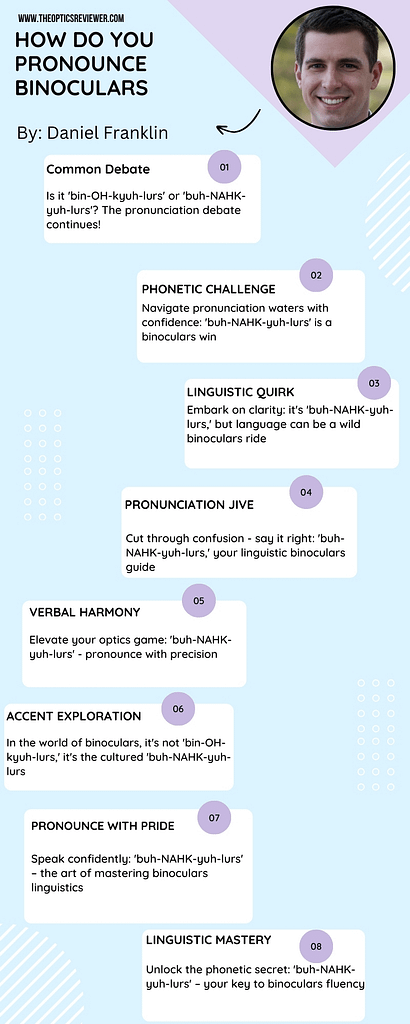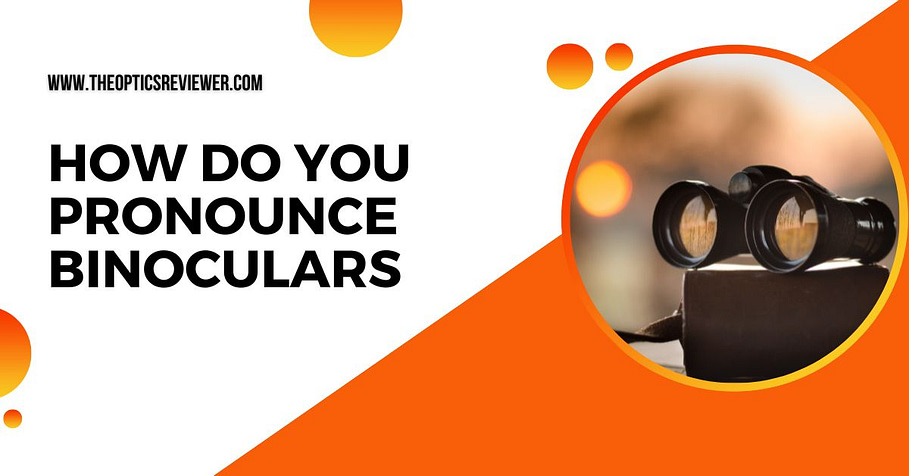Unravel the mystery of pronunciation with our guide on How Do You Pronounce Binoculars. Whether you’re a nature enthusiast or a tech aficionado, getting the pronunciation right adds a touch of confidence to your conversations. Pronouncing “binoculars” may seem straightforward, but variations abound.
Are you saying it with a short or long i? Join us on a linguistic journey to demystify the correct articulation. Let’s ensure you’re not just observing the world through your lenses but also expressing yourself with clarity. Embrace the joy of learning and enhance your verbal finesse as we dive into the nuances of saying binoculars the right way.
Contents
- 1 Key Takeaways
- 2 What is the Origin of The Word Binocular?
- 3 How Do You Pronounce Binoculars?
- 4 What is the Correct Pronunciation of Binoculars?
- 5 What are Some Tips For Practicing the Pronunciation of Binoculars?
- 6 What are the Uses of Binoculars?
- 7 Conclusion
- 8 References
- 9 Frequently Asked Questions
- 9.1 Are There Different Pronunciations of the Word Binoculars in Different Languages?
- 9.2 Are There Any Common Mispronunciations of the Word “Binoculars”?
- 9.3 Are There Any Alternative Terms or Slang Words for “Binoculars”?
- 9.4 Can the Pronunciation of “Binoculars” Vary Depending on the Speaker’s Accent or Dialect?
- 9.5 Are There Any Regional Variations in the Pronunciation of “Binoculars” Within a Particular Language?
Key Takeaways
- The word ‘binoculars’ originated from the French word ‘binoculaire’ borrowed from Latin.
- Binoculars are optical instruments designed for viewing with both eyes.
- Binoculars have various purposes beyond birdwatching and stargazing, including wildlife observation, sports events, opera or theater performances, and appreciating landmarks and natural wonders from a distance.
- There are different types of binoculars available in the market, each with its own features and specifications.
What is the Origin of The Word Binocular?
The origin of the word ‘binocular’ can be traced back to its French counterpart, ‘binoculaire’, which was borrowed from the Latin words ‘bini’ and ‘ocularis’. In Latin, ‘bini’ means ‘two by two, twofold, two apiece’, while ‘ocularis’ means ‘of the eye’. This etymology reflects the nature of binoculars as an optical instrument designed for viewing with both eyes.
There are other words derived from Latin that have a similar meaning to ‘binocular’. For example, ‘binoculus’ in Latin means ‘two-eyed’ and ‘geminus’ means ‘twin’. These words emphasize the binoculars’ characteristic of having two optical tubes and providing a stereoscopic view.
Common misconceptions about binoculars include the belief that they are used only for birdwatching or stargazing. While these activities are popular uses, binoculars are versatile tools that can be used for a wide range of purposes, such as wildlife observation, sports events, and even opera or theater performances.
Binoculars are particularly useful for observing famous landmarks or natural wonders from a distance. Examples include the Grand Canyon, Niagara Falls, Mount Everest, and the Great Barrier Reef. With binoculars, one can appreciate the intricate details and beauty of these landmarks, even from afar.
In different languages, binoculars are referred to by various alternative names. For instance, in Spanish, they are called ‘binoculares’, while in German they are known as ‘Fernglas’ (literally meaning ‘far-seeing’). These alternative names reflect the function and purpose of binoculars in different cultures.
In the market, there are different types of binoculars available, each with its own features and specifications. Some common types include compact binoculars, zoom binoculars, and astronomy binoculars. Compact binoculars are portable and lightweight, making them ideal for travel and outdoor activities. Zoom binoculars allow for adjustable magnification, while astronomy binoculars are specifically designed for stargazing and provide a wider field of view.

How Do You Pronounce Binoculars?
To correctly pronounce the word ‘binoculars,’ it is important to emphasize the correct stress on the second syllable and pronounce it as ‘bi-NAHK-yoo-lars.’ Pronouncing binoculars correctly is crucial for effective communication, as mispronunciations can lead to confusion or misunderstandings. Here are some common mispronunciations of binoculars:
- bi-NOCK-yoo-lars
- bi-NOCK-yoo-lers
- bi-NOCK-yoo-lurs
- bi-NOCK-yoo-lahs
- Break down the word into syllables and practice saying each syllable separately.
- Use visual aids, such as pictures of binoculars, to help children understand the word and its pronunciation.
- Encourage children to repeat the word multiple times, focusing on the correct stress and pronunciation.
- Make it a game by incorporating rhymes or tongue twisters that involve the word binoculars.
Funny anecdotes about mispronouncing binoculars can lighten the mood and create a sense of belonging. Sharing stories of mispronunciations can help people relate and laugh together, fostering a sense of community and shared experiences.

What is the Correct Pronunciation of Binoculars?
The correct pronunciation of the word ‘binoculars’ is /bɪˈnɒkjʊlərz/. However, it is not uncommon for people to mispronounce this word. Here are some common mispronunciations of binoculars:
- bi-NOCK-yoo-lars
- bi-NOCK-yuh-lars
- bi-NOCK-u-lars
- bi-NOCK-yoo-lers
Regional variations in pronunciation can also contribute to the diversity of how binoculars is pronounced. For example, in some regions, the emphasis may be placed on the first syllable, while in others, it may be on the second syllable.
Regional variations in pronouncing binoculars may exist, with slight differences in emphasis or intonation. For example, in some regions, people may pronounce it as ‘bi-NAHK-yoo-lers’ or ‘bi-NAHK-yoo-lahs.‘ It is important to be aware of these variations and adapt accordingly to ensure effective communication.
Even famous people have struggled with pronouncing binoculars. There have been instances where public figures have stumbled over the word during speeches or interviews, leading to funny anecdotes. These stories provide a lighthearted touch to the challenges of pronouncing binoculars.
Non-native English speakers may face additional pronunciation challenges when it comes to binoculars. The combination of sounds, such as the ‘n’ and ‘l’ sounds, can be tricky for those who are not accustomed to the English language’s phonetics.
If interested you can read more about when were binoculars invented.
What are Some Tips For Practicing the Pronunciation of Binoculars?
Continuing the discussion on pronouncing binoculars, it is essential to focus on effective tips for practicing the correct pronunciation of this word. Many individuals struggle with pronouncing binoculars correctly, often making common pronunciation mistakes.
One way to improve pronunciation is by practicing tongue twisters specifically designed to target the pronunciation of binoculars. These tongue twisters can help individuals develop the necessary muscle memory and coordination required to pronounce the word accurately.
In addition to practicing tongue twisters, there are other tips for improving the pronunciation of difficult words like binoculars. One helpful technique is to break down the word into smaller, manageable syllables and practice pronouncing each syllable separately before combining them. This allows individuals to focus on each sound and ensure they are pronounced correctly.
Common mispronunciations of binoculars include “bi-NOCK-yoo-lars” or “bin-OCK-yoo-lars.” To correct these mispronunciations, it is crucial to emphasize the correct stress on the second syllable, pronouncing it as “bi-NAHK-yoo-lars.”
To master the pronunciation of binoculars, individuals can employ techniques such as recording themselves pronouncing the word and listening back to identify any errors. They can also seek feedback from others or work with a speech therapist to refine their pronunciation.
If interested you can read more about how to set binoculars.
What are the Uses of Binoculars?
Binoculars are versatile optical devices commonly used for magnifying distant objects and enhancing visual clarity. They have a wide range of uses in various activities, making them an essential tool for many individuals. To help you understand the different applications of binoculars, here is a table showcasing some popular brands and their specific uses:
| Brand | Use |
|---|---|
| Nikon | Birdwatching, wildlife observation |
| Zeiss | Hunting, outdoor activities |
| Swarovski | Astronomy, stargazing |
| Canon | Sports events, concerts |
| Leica | Travel, sightseeing |
Choosing the right binoculars for your needs depends on the specific activity you plan to engage in. Birdwatchers, for example, may prefer binoculars with a wider field of view, while stargazers might opt for ones with a higher magnification power. It’s important to consider factors such as lens size, weight, and durability when making a decision. Additionally, there are common mistakes to avoid while using binoculars, such as improper focusing and incorrect eyepiece positioning.
Binoculars can also enhance the experience of viewing famous landmarks and events. From observing the intricate details of architectural wonders like the Eiffel Tower to getting a closer look at athletes during the Olympics, binoculars can provide a more immersive and captivating view. They truly are indispensable tools for those seeking to appreciate the world around them with enhanced visual acuity.
If interested you can read more about Eye Relief Binoculars.
Conclusion
In conclusion, How Do You Pronounce Binoculars is a small yet impactful triumph in effective communication. Now armed with the knowledge, confidently navigate conversations without hesitation. Embrace the clarity and share your newfound expertise, as you enlighten others on the proper articulation of this word.
Pronounce with pride, and let the world hear your linguistic finesse. Say it with confidence – it’s not just about binoculars; it’s about articulation mastery. Elevate your language skills, one word at a time.
References
- https://core.ac.uk/download/pdf/212800020.pdf
- https://onlinelibrary.wiley.com/doi/abs/10.1111/j.1755-3768.1978.tb01375.x
- https://onlinelibrary.wiley.com/doi/abs/10.1111/j.1755-3768.1978.tb01375.x
- https://link.springer.com/article/10.1007/BF00229264
Frequently Asked Questions
Are There Different Pronunciations of the Word Binoculars in Different Languages?
There can be variations in the pronunciation of the word ‘binoculars’ across different languages. Funny mispronunciations and slang terms may exist in different regions. Additionally, the pronunciation can differ between British and American English, and there may be dialectal variations within English-speaking countries.
Are There Any Common Mispronunciations of the Word “Binoculars”?
Common mispronunciations of ‘binoculars’ include bi-NOCK-yuh-lurs and bi-NUCK-yuh-lurs. To pronounce it correctly, emphasize the first syllable: bi-NOCK-yuh-lurs. The word originates from the Latin ‘binoculus’ and its correct pronunciation reflects this. Avoid mispronunciations by practicing and enunciating clearly.
Are There Any Alternative Terms or Slang Words for “Binoculars”?
Some slang terms for binoculars include “bins” and “binos.” In different languages, binoculars are called “jumelles” in French, “fernglas” in German, and “prismáticos” in Spanish. Alternative names for binoculars are “field glasses” and “spyglasses.”
Can the Pronunciation of “Binoculars” Vary Depending on the Speaker’s Accent or Dialect?
Accents and dialects can affect the pronunciation of various words, not just binoculars. Pronunciation can vary across English-speaking countries, and certain words may have multiple pronunciations based on accent or dialect. This can impact communication and understanding in different regions.
Are There Any Regional Variations in the Pronunciation of “Binoculars” Within a Particular Language?
Pronunciation variations of ‘binoculars’ in different regions can be influenced by cultural and historical factors, as well as linguistic differences within a specific country. Moreover, the pronunciation may also differ among different social groups within a community.

